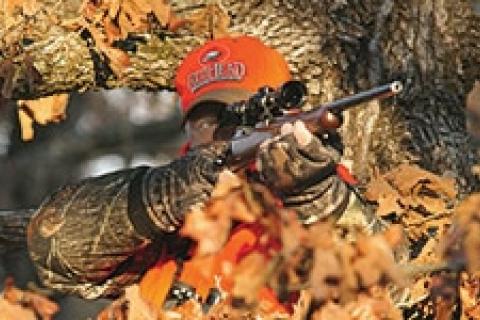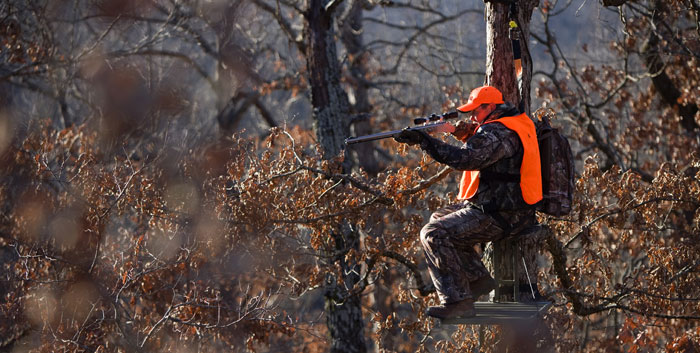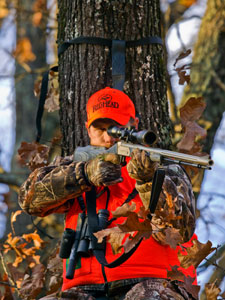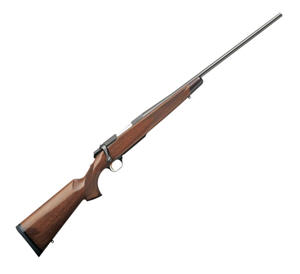
Selecting a good all-round deer gun can be a daunting task for sure. Some hunters prefer a super-accurate long-range rifle, but such rifles typically are heavy, with long barrels. If you must carry one of these guns over long distances in rough terrain, you may wish you had purchased a lightweight stalking rifle instead. If a lightweight model is purchased, however, you may not be able to achieve the true "tack-driver" accuracy obtainable with a long-range specialist. Also, light rifles are harder to hold steady for accurate shooting.

If your head isn't reeling yet, we've just gotten started.
Rifle or Shotgun? (When You Have a Choice)
Deer hunters also can choose between rifles and shotguns, and must select from different action designs, cartridge power and a variety of stocks and barrels. The variations seem endless, and some hunters become frustrated when trying to choose a gun that incorporates all the features they consider necessary in the ultimate deer gun.
Aaron Pass, one of the country's foremost gun experts and shooting writers, says shotguns are the best choice only when legally required or dictated by special safety situations.
 "In most cases," Pass notes, "the new specialized slug guns with rifled barrels and sabot slugs are very effective and accurate out to 100 yards or a bit more. Beyond 125 or 150 yards, the steeply dropping trajectories and loss of energy make even these slugs questionable. Traditional Foster-type slugs from smoothbores are rarely accurate beyond 75 yards. Buckshot is unreliable beyond 35-40 yards."
"In most cases," Pass notes, "the new specialized slug guns with rifled barrels and sabot slugs are very effective and accurate out to 100 yards or a bit more. Beyond 125 or 150 yards, the steeply dropping trajectories and loss of energy make even these slugs questionable. Traditional Foster-type slugs from smoothbores are rarely accurate beyond 75 yards. Buckshot is unreliable beyond 35-40 yards."
If a rifle is the firearm of choice, buyers may want advice on action designs. Which is best — lever-action, pump, bolt-action or semi-auto? Pass offers this summation: "The bolt-action is generally considered to be the most inherently accurate action. It is also the action type most easily refined to greater accuracy. The other action types — lever, pump and autoloader — are all capable of various degrees of practical hunting accuracy and allow faster follow-up shots. However, if one of these is not as accurate as a shooter desires, there's not much that can be done about it."
Rifle Caliber Choices
When asked how one decides which caliber is best when choosing a rifle, Pass says, "For truly all-around deer hunting (a national standard), a cartridge that shoots a 120- to 150-grain bullet faster than 2,500 fps is adequate out to 200 yards or so. As velocity increases so does effective range.
 |
| Browning® A-Bolt II Medallion Bolt-Action Rifle |
"My personal favorite deer rifle is a Winchester M70, in .270 Win. with a 1.5x-6x Burris scope and a synthetic stock," he continues. "I don't shoot at extremely long range and there's no 'normal' deer hunting situation I can imagine that this rig is not capable of handling. That said, there is no inherent magic in any of the above criteria. There are plenty of other combinations that would work just as well."
![]() Tip: Shop Firearms at Cablea's
Tip: Shop Firearms at Cablea's
![]() Tip: Shop Rifles & Shotguns at Bass Pro Shops
Tip: Shop Rifles & Shotguns at Bass Pro Shops
Whether you want long-range accuracy, a rifle that's a joy to carry or some other specialization, Pass recommends buying a new rifle in the configuration you desire. "The well-known rifle models — Browning's A-Bolt rifle, Remington's 700 rifle models, Ruger's M77 rifle, Savage's 110 Trophy Hunter XP Rifle, Weatherby's Mark V rifles, Winchester's 70 Bolt Action Rifle and many others — designate the action design," he says. "Gun makers attach a wide variety of specialized stocks and barrels to these basic actions to create a variety of specialized rifles. Hunters should check out the manufacturers' catalogs, or visit a gun shop, and choose a combination of features that achieve the hunter's goals for functionality and design."
In the end, therefore, finding the ultimate deer gun is largely a matter of personal preferences. Buy a gun you like that's legal for your hunting area, one you believe will get the job done where you hunt. That's the first step toward achieving your goal.
![]() Read also: Use This Rifle Caliber Chart to Pick the Right Ammo for Hunting
Read also: Use This Rifle Caliber Chart to Pick the Right Ammo for Hunting
A Few Words About Gun Stocks and Finishes
Several materials are used for making gun stocks. Wood is favored by many for its beauty, but wood also does unpredictable things when exposed to changing weather. Your wood-stocked rifle that shot perfectly in the bottomlands of Louisiana may shoot a foot higher than it was sighted in for when you take it to the mountains of Colorado. This is why many hunters prefer shooting guns with stocks made from Kevlar, fiberglass, graphite, epoxy or other synthetics that won't shift, warp or bend like wood.
The lightest, strongest synthetic stocks are made of Kevlar, and equally good ones, although heavier, are made of fiberglass. Below this level are a half dozen other materials that are much less expensive, but satisfactory.
Gun finishes are another consideration. Traditionalists usually prefer the nice look of blued steel. Stainless steel, however, rusts much more slowly and tends to last longer because it is more resistant to the scorching of powder gas. Most experts consider this one a toss-up. If you simply don't like a bright metal finish, choose blued steel. But if you'd rather not worry about the gun, go stainless.
- 31938 views

